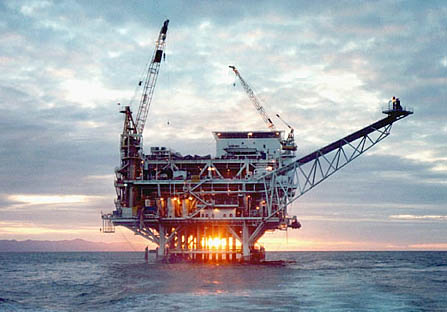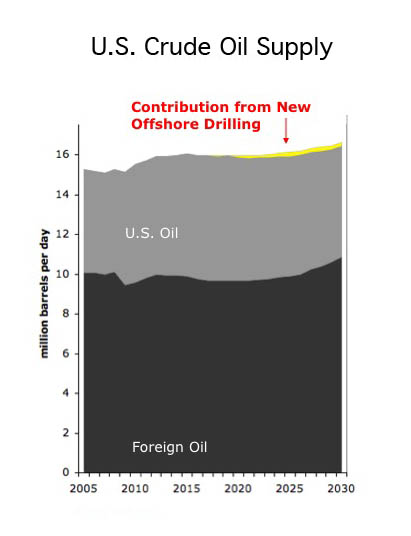
The United States has an estimated 112 billion barrels of potentially recoverable oil. Sounds like a lot, doesn't it? Well, actually, it's not all that much.

In an earlier post, we showed that if we could access all of our recoverable oil, it would provide enough fuel to power all our cars for maybe 15 years -- a far cry from sustainable energy independence.
Still, that's something, so, some argue, let's get started drilling now and get it out of the ground and into our cars ASAP. Some of the nation's untapped oil resources are believed to be located offshore on the outer continental shelf (OCS). So, many want restrictions on offshore drilling lifted so that we can access this oil. Others oppose drilling because of environmental and economic concerns. Perhaps because this is an election year, the debate on offshore drilling has become heated and even, at times, emotional.
All politics aside, I would like to share with you the information I have been able to gather with regard to the amount of oil we might be able to get from offshore drilling.
Offshore Drilling Would Provide a Drop in the Bucket
The impact on oil supplies from additional offshore drilling on the U.S. OCS looks to be very small indeed. The graphic below -- adopted from Architecture 2030 -- provides a great illustration of the veritable drop in the bucket that offshore drilling will bring to our gas pumps. (The yellow sliver indicates how much bang we'd get out of our drilling bucks.)
 According to an analysis and data from the Energy Information Administration (EIA), the earliest this oil would start dribbling in would be around 2017, and the initial rate of production would be about 10,000 barrels of oil per day. At their peak in the mid-2020s, the wells would yield about 20,000 barrels per day.
According to an analysis and data from the Energy Information Administration (EIA), the earliest this oil would start dribbling in would be around 2017, and the initial rate of production would be about 10,000 barrels of oil per day. At their peak in the mid-2020s, the wells would yield about 20,000 barrels per day.
To put these numbers in context, consider that we bring in about 15 million barrels of crude a day. If we keep on our present course, U.S. consumption of oil will increase moderately in the next couple of decades reaching about 17 million barrels of oil per day by 2030. In that case, OCS drilling will supply:
- about 0.06 percent in about 9 years and
- about 1 percent at its peak in the mid-2020s.
Clearly, offshore drilling is not going to get us to energy independence, not even close.
What about the price at the pump? Analyses, including the government's own, predict that any price reduction will be in the neighborhood of pennies and not dimes and certainly not dollars. But keep in mind that price impact is difficult to predict because oil prices are influenced by speculation -- and hence investor's assessment of future trends -- as well as supply and demand.
Fuel Efficiency and Mass Transport Are Real Cost-Reducing Solutions
By comparison most studies show that a very significant reduction in our dependence on foreign oil and in gas prices would arise from decreasing our demand for oil -- for example, by investing in technologies to increase the fuel economy of our cars and in mass transport. (See here [pdf].) That's why so many of us see a great benefit from these types of investments.
Nevertheless, some folks still favor OCS drilling. They argue that we need to do everything we can to advance energy independence, insisting that every drop counts and we should therefore drill regardless of how much it will yield. Such an argument is not in my view entirely without merit. But others, usually environmentalists, argue cogently against OCS drilling because of its environmental costs.
So, what's the bottom line? Should we allow new offshore drilling or not? I suspect that your answer largely depends on your politics. But the facts are the facts, and if someone tells you that offshore drilling is going to make more than a dent in our dependence on foreign oil or the price at the pump, he or she is trying to sell you shares to a bridge to nowhere.
Sources
EIA - Forecasts and Analyses - www.eia.doe.gov/oiaf/forecasting.html
EIA - Impacts of Increased Access to Oil and Natural Gas Resources in the Lower 48 Federal Outer Continental Shelf - www.eia.doe.gov/oiaf/aeo/otheranalysis/ongr.html
Dr. Bill Chameides is a member of the National Academy of Sciences and the dean of Duke University's Nicholas School of the Environment. He blogs regularly at www.thegreengrok.com.